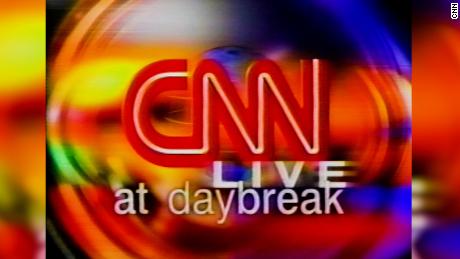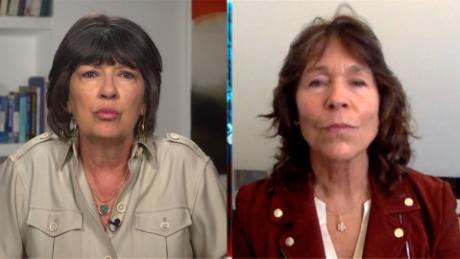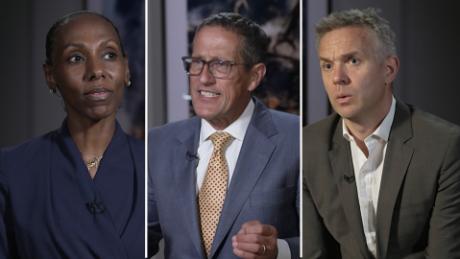(CNN)America went into battle on September 11, 2001, united in defense of its values and way of life.
Twenty years on, it is at war with itself, its democracy threatened from within in a way Osama bin Laden never managed.
In the moment, the 9/11 attacks that came from a blue sky on a crisp, clear morning stretched credulity in their horror and dastardly conception and proved that vast oceans could no longer shield the US from the terror of the outside world.
But for a few weeks at least, everyone -- liberal, conservative, no matter the race or creed -- was as one in mourning nearly 3,000 dead and fearing more strikes.
In hindsight, however, the attacks heralded the dawn of an era of political trauma and turbulence that snuffed out a brief period when a prosperous US had basked in a post-Cold War glow of peace, standing as a lone superpower.
History gives events clarity that they lacked in real time. But it cannot record the pain, panic and disorientation of those terrible, aching days after 9/11 that drove the decisions of political leaders. In retrospect, it's now clear that despite the heroism of thousands of troops killed or maimed in post-9/11 wars, the excesses of the US political response caused as much, if not more, upheaval as the attacks themselves.
September 11, 2001, doesn't explain everything. But the war on terror took America in a political direction from which there was no coming back.
A sharp, successful war in Afghanistan bogged down into a 20-year quagmire that ended only last month. Another war in Iraq, fought on false pretenses, was its own early version of a Big Lie. A new government security state designed to thwart follow-on attacks endures. Trust in Washington was buckled by vast surveillance programs. America's name was soiled by torture. The judicial war on terror stretched the Constitution.
President George W. Bush went from being a champion on the rubble at Ground Zero to a leader destroyed by his own war. His successor, Barack Obama, spent two terms struggling to bring the anti-terror campaign within the law and international morality, but his use of lethal drone strikes to take out terror targets also caused civilian casualties and was condemned by human rights advocates.
All the while, the thousands of deaths and injuries in foreign wars, the trillions of dollars spent on nation building, fury at Washington elites and prejudice against Islam brewed a pool of resentment ripe for a demagogue. And along came Donald Trump, vowing to ban Muslims from entering the US and boasting he was smarter than all the generals who led years of draining combat.
The political wounds of the post-9/11 years were exposed yet again in recent days, as the chaotic final withdrawal from Kabul brought history full circle: The fundamentalist Taliban -- who welcomed al Qaeda -- rule Afghanistan again.
Bin Laden -- who sent suicide hijackers to steer fuel-laden jetliners at icons of US political, economic and military power -- believed the US was corrupt, weak and immoral. But even he would be surprised to observe the bitter internal estrangement he helped to unleash.
Was it worth it?
A walk through the lush, grassy avenues between the graves of America's post-9/11 war dead in Section 60 of Arlington National Cemetery -- within sight of the flight path of the hijacked jet that screeched into the Pentagon -- poses a haunting question: Was the war on terror worth the cost?
Rows of white headstones -- some bearing tokens like unit badges, photos or even bottles of beer -- commemorate those lost in Iraq and Afghanistan. Thousands of civilians caught in the crossfire of two decades of American war have no memorials in Washington.
Robert Gates, the former Bush and Obama defense secretary, reflected Thursday on what had been won and lost.
"Nobody on September 12, 2001, would have dreamed that we would go 20 years without another major attack on the United States," Gates said at an Aspen Security Forum event. "By the same token, I think that the costs of these wars in lives lost, in lives changed forever on the part of our military and many of our civilians who served and the cost to the country in terms of treasure and everything else have been enormous."
In the furor over the mismanaged withdrawal from Afghanistan, it was often forgotten that the first battles of the war on terror succeeded, as the US crushed al Qaeda -- though bin Laden escaped through Tora Bora's caves.
"Going into Afghanistan for its stated purposes at the time made it worth it," said Obama's former Homeland Security secretary, Jeh Johnson, arguing at a Bipartisan Policy Center forum that three administrations had degraded al Qaeda's capacity to hit the US.
While underscoring that it could never be "worth it" to lose a son or daughter in war, Johnson said: "It was obviously costly, very costly. We ended up in a place where the Taliban is in charge again, but a lot has happened in that 20-year period that I think has made the homeland safer."
The 'volunteer wars'
But what can be said of the years long after the attacks on New York and the Pentagon and the crash of a plane believed to be heading to the US Capitol brought down by passengers in Pennsylvania? With al Qaeda routed, Americans were still dying in a futile effort to build a functioning Afghan state. Were their deaths in vain in a war that ended in US defeat? Was their service betrayed by political leaders?
Tony Brooks -- who served as an Army Ranger in Afghanistan and Iraq -- insisted that despite the recent US exit, the sacrifices of those who served gifted freedom to a generation of Afghans, citing the case of any young girl there.
"She lived her life for 20 years. To say it's all for nothing is just discarding the children and the women of Afghanistan, in my opinion," Brooks said.
Brooks, who left college and joined up after 9/11, also pointed out that the burdens of the war on terror were not equally shared and said media coverage did not fully reflect the reality of losses across the country.
"These wars were very unique in the fact that they were 100% volunteer," said Brooks, adding that the fighting happened in the "shadows" and got news coverage only when something went wrong.
"I don't think (the troops) were ever honored, to be honest, ever. Because of the all-volunteer army, it was easy to dismiss. If we were forcing people to go it would be a different story."
President Joe Biden understood the toll inflicted on small towns and cities across America -- one that undoubtably factored into the politics of the last 20 years.
"How many thousands more of America's daughters and sons are you willing to risk?" he asked when explaining his decision to leave Afghanistan. "How long would you have them stay? Would you send your own son or daughter?"
If the 9/11 attacks were a failure of imagination by US authorities -- who would have thought a terror gang armed only with box cutters could humble a superpower? -- Iraq was a case of overimagination, as political leaders shocked by the mass casualties of 9/11 fretted about what a tyrant with nuclear weapons could do.
But the Bush administration's invasion was also an example of US hubris, as it sought new targets after al Qaeda. The failure to find weapons of mass destruction, the miscalculation that the US troops would be greeted as liberators instead of targets for insurgents and the malfunctioning Iran-influenced state that the US left behind dealt a devastating blow to trust in government -- and the credibility of the mainstream media, which was insufficiently skeptical about the war. Further, the power vacuum left in the wake of dictator Saddam Hussein's overthrow, capture and execution spawned a terror group more ruthless than al Qaeda: ISIS.
These were all factors that thickened the stew of mistrust Trump later exploited.
How 9/11 wars shaped the national mood
Without the disaster of Iraq, America might not yet have had its first Black president. Back when he was still an Illinois state lawmaker, Obama said he was not a pacifist but opposed "dumb wars." The message resonated in 2008, and his creed of hope offered relief from the Bush years, when the post-9/11 wars were going bad.
And if Obama had not been in the Oval Office, Trump would have lacked fuel for a backlash campaign rooted in the racist claim that the 44th President was not born in the United States. But in 2016, Trump also touched a national mood, channeling supporters who believed that the political, economic, military and media establishments ignored a great swath of a hurting country.
Trump ran as a classic strongman, exploiting weariness with 9/11 wars, hollowed-out rural economies and a feeling that the world was taking America for a free ride. His call for a "total and complete shutdown" on Muslim immigration played on suspicion of outsiders left over from 9/11 and mirrored his demonization of Mexican immigrants. His claim that he was spied on by the Obama administration would have found less traction but for revelations about government surveillance by Edward Snowden.
Where Obama outlawed torture, Trump championed it. After Obama built bridges with the Muslim world, his successor complained that the US didn't steal the oil in Iraq.
"You have to fight fire with fire," Trump said, backing waterboarding. "We have to be so strong. We have to fight so viciously. And violently, because we're dealing with violent people."
In retrospect, Trump's rhetoric foreshadowed his introduction of violence into political debate, which culminated in his incitement of the mob that invaded the US Capitol inspired by his lies about election fraud.
Ruth Ben-Ghiat, a New York University history professor, said Trump fused elements of the new security state -- like a tough Department of Homeland Security and torture of terror suspects -- into his own brand.
"It's hard to draw a direct line from the reaction to 9/11 to Trump, but he weaponized the illiberal policies and attitudes that flourished in those years," Ben-Ghiat said. "He takes all those seeds disseminated in those years and he puts them in a package of authoritarian-style politics."
'It was about us'
Twenty years on, the emotive power of September 11 has eased, though not for the bereaved. And small moments can bring memories of that day of infamy rushing back -- like the glint of an airliner flying above city skyscrapers or a watch showing 8:46 a.m., the time when the first plane hit the North Tower of the World Trade Center.
A generation of Americans has grown up in the world that 9/11 made. Babies born weeks after the attacks are now college sophomores. Some of the first Americans to fight have now sent their own kids to foreign battlefields.
Bush once warned of a multigenerational struggle against terrorism. But climate change and the rise of China are now seen as bigger threats. And the most acute danger from terrorists is now homegrown. Al Qaeda may have failed to hit the Capitol, but the building was attacked by extremists who confirmed government warnings that White supremacy is now the country's top terrorism threat. After 9/11, America united to defend itself. It failed to do the same when confronted by a president who mounted an assault on democracy.
Divides also cleaved the country in another national crisis -- the coronavirus pandemic, which kills more people every two days than died on September 11, 2001. If a new 9/11 happens, it's difficult to believe the national and political unity forged by the first one would be repeated.
Beyond politics, and as he contemplates 9/11 on the 20th anniversary, Brooks -- who now practices chiropractic medicine and authored a book, "Leave No Man Behind," about his wartime service -- laments a loss of national togetherness.
"That was the most unifying event in my lifetime, and since then it felt like every major event that happens in the world just divides us even more," he said.
"It's not the same world, where the mission was greater than self. It was all about us, not me. I think right now it's about me."
"how" - Google News
September 11, 2021 at 11:06AM
https://ift.tt/3E7PMpC
How 9/11 forged an age of political turmoil - CNN
"how" - Google News
https://ift.tt/2MfXd3I
Bagikan Berita Ini




















0 Response to "How 9/11 forged an age of political turmoil - CNN"
Post a Comment